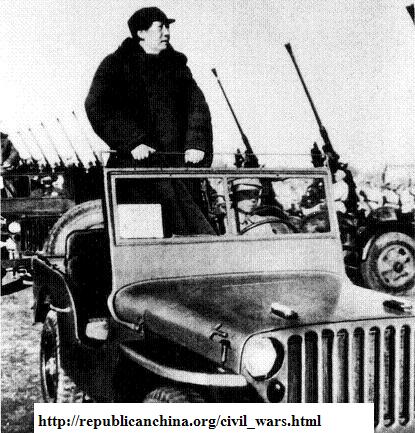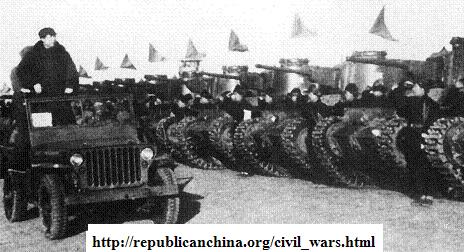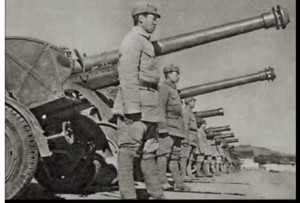A Re-compilation of Old Postings
http://www.chinahistoryforum.com/index.php?/topic/16356-what-role-did-us-play-in-chinese-civil-war/
Better read it the other way: What’s the American purpose in destroying the KMT government during the Chinese civil war?
The Americans sold out China in Tehran, Yalta and Potsdam. In late 1944, Admiral Leahy was probing China about the Russian [Soviet] demand for Dairen, Port Arthur and the Chinese Eastern Railway, plus Outer Mongolia. Roosevelt locked up the secret treaties in his drawer till his death. Both Hurley and Leahy merely knew part of Roosevelt’s deals with Stalin. Truman pressured China numerous times regarding the signing of an agreement with the Russians (Soviets) no later than July 1st, 1945. Late 1945, the Americans continued to sell out China on the matter of the Russian [Soviet] pillage of Manchuria. The United States, together with the Soviet Union and Britain, held a so-called three foreign minister meeting, and made a declaration to force the Republic of China into taking in the Chinese Communists in a coalition government. This so-called declaration, in another sense, sealed the fate of the Republic of China in that no outsider would ever provide assistance to the Republic of China should the civil war break out in China, namely, a world-level arms embargo against the Republic of China. Marshall’s treachery then followed. G Marshall, as Wedemeyer said, first armed China and then disarmed China. The U.S. arms embargo continued till well after the passage of the China Aid Act of 1948, and ammunition did not get released till Nov of 1948. After the shipping, Acheson and his undercover Russian agents further attempted to order the ships to turn around. In Oct 1949, Acheson pleaded with the British for recognition of communist China, which Britain did on Jan 1st, 1950. After that, Acheson declared the Aleutian curvature, which culminated in the eruption of the Korean War.
The Chinese civil war was a Russian [Soviet] proxy battle. It was 20 billion U.S. dollars that Roosevelt gave to Stalin during WWII, plus billions of more U.S. aid for the Russian invasion of Manchuria, that doomed China. -Remember Mao had no more than 160,000 guns in Aug 1945. Vladimirov Diaries had two locations detailing the total communist army headcounts, and it was about 300k+ at the end of Japan’s surrender in August 1945.
Chiang was a rare nationalist and a patriot China ever had in the history of thousands of years as historian Tang Degang commented to be. I am more convinced of it after I read his diaries. Everyday, he kept his diaries and repeated a motto for himself, about 16-20 characters long, about strengthening will, suppressing desire, and etc. His sticking to drinking water/tea showed his commitment to promise and swear. The two-time marriages, with Chen Jieru and Mei-ling Soong, respectively, had perhaps reshaped his life for good and better. Even George Marshall had to privately admire Chiang and then put blames on the two Chen brothers as the “reactionaries”.
I happened to be reading the section of Wellington Koo’s memoirs of March 1946. Chiang was asking at the party executive meetings whether you wanted to fight the Russians to reclaim Manchuria or you want a diplomatic and political solution. Senior KMT leaders, like the Western Hill faction and Transportation Department faction, adamantly demanded a confrontation with the Russians. It was Chiang who showed the diplomatic wisdom. Similarly, throughout 1942-3, the Chinese communists, being scared by the German siege of Moscow and Stalingrad as well as the Comintern’s dissolution, were spreading rumors both in China and in America about Chiang’s attempt to solve the communist problem militarily. It was Chiang who had time and again ascertained the policy of political solution regarding the communists at each and every KMT meeting. Looking at the relationship of Chiang with a dozen of his sworn brothers, they had life-long friendship, except for Feng Yuxiang and Li Zongren who were ambitious to succumb to their sworn brother’s rule.
The Americans had no hand in Chiang’s retreat to Taiwan. In contrary, quite some pro-communist Americans had suggested that the communists attack at Taiwan before the communists were to march against southwestern China. The Americans in Hongkong perhaps, about that time, deliberately issued visas to the Tibetans without Chinese passports. The Russian (Soviet) agents inside of the U.S. Department of State was trying to incite a Tibetan independence as an echo of the communist attacks at southwest China. It was the mentor Owen Lattimore with an unofficial desk in the U.S. State Department, a so-called professor without a college degree, someone who had ‘adopted’ the Mongols and Tibetans and someone who harbored the CPUSA gang from the Qinghua University class 1925 in the Institute of Pacific Research, who designed the United States’ Taiwan or Formosa policy. Mao and the communists, though, were keen on attacking southwest China. You could see the plan if you read the account by Xiong Xianghui’s son, regarding the communist attempt at delaying Hu Zongnan’s troops at the Qinling Ridge from a retreat to southwest China.
Communist propaganda: The most notable is Suzanne Pepper, a student of Fairbanks.
Chiang’s weakness was his softness. He could have routed the communists in 1935. But he then changed mind to negotiate with Stalin. Before the Xi’an coup, there were multiple channels of talks between the KMT and the CCP. The Chen brothers, and TV Soong, had all resorted to political solution to the communist problems. The Chinese communists, though, pushed Stalin’s Comintern policy one step further, inciting Zhang Xueliang and Yang Hucheng into a coup, and had to correct the stance after Stalin intervened to have Chiang released.
Chiang’s strength was his intuition. Or, in another word, instinct. At Cairo, Chiang was suggesting to Roosevelt that the U.S. and China jointly develop port Arthur. Chiang was smart enough to know the Russians would be after him sooner or later. You would understand what I meant by ‘instinct’ when you read Wellington Koo’s memoirs.
By the way, G Marshall, from 1946 to 1948, repeatedly probed numerous Chinese officials and generals as to who could be Chiang’s successor. The U.S. Department of State, run by the Russian (Soviet) agents, were repeatedly sending out rumors about getting a successor for Chiang. China’s enemies knew that Chiang was a patriot that must be rid of so that their colonial and communist ulterior objectives be reached, respectively.
G Marshall’s calling the Chen brothers as reactionaries was another example. Chen explained why the communists hated him a lot. Chen said he had converted hundreds of thousands of communists. That’s why the communists, and G Marshall, hated him the most.
China’s enemies did not know that the Chinese power structure did not rest with the Chen brothers. On another thread, I had explained the China Resource Committee, run by economic minister Weng Wenhao and technocrat Qian Changzhao, that controlled all China’s heavy industries. HH Kung and TV Soong at most controlled the banks. Other than the above factions, you have the Western Hill faction, transportation department faction, political research faction, and etc. On the occasion of March 1946 executive meeting, e.g., senior KMT leaders, about 20, walked out of the conference in protest of Chiang’s policy with the Russian (Soviet) occupation of Manchuria. Hope you see my point.
Vladimirov was Stalin’s representative to Yenan from 1942 to 1945. All cables and telegrams between Mao and Stalin were through this person. Vladimirov had another exposure of how Mao sent Deng Fa to the worker union meeting in London, where the communists faked a number of total workers in China. In London, the Russians claimed to have 10-20 million workers, while the U.S. claimed to have 6-7 million and the British 4-5 million. See my point about the communists’ fabricating numbers at random?
By the way, Vladimirov Diaries carried full letters about the Jiangxi communists’ accusation of Mao’s purge in the Anti-Bolshevik League. Guess what? Some good conscience communists hid the letters throughout the Long March and the Rectification Movement to present the evidence to the Russians. This is the same piece of information that Jung Chang claimed to have ‘creamed’ from the Russian archives.
As to your number of 700,000 Japanese guns, you were daydreaming. A Japanese Shidan of 25000-30,000 had two Ryodan; each Ryodan had two infantry Rentai; One Rentai had about 4000 rifles. So, one Shidan had about 16,000 guns. Japan had about 40-50 Shidan in China in 1945, or about one million troops. The total guns were about 700,000 guns. Apparently you don’t know how many Chinese soldiers must die to kill one Japanese. The ratio was 3-5 Chinese against one Japanese, at minimum.
You had no clue about the American communists inside of the U.S. State Department, and Treasury Department. Check the VENONA scripts and then reflect on what you said. The U.S. Fleet sailing into the Taiwan Straits during the Korean War was a last attempt by the Russian spies to isolate Chiang from taking advantage of the Korean War. Mao sent 60% of his infantry to a rotation duty in Korea. And, in Oct, 1949, Mao had no more than 2 million guns in total.
http://republicanchina.org/Communist-2-million-guns-1950.jpg
Happened to be reading the Wellington Koo memoirs, period of May 1946 today. Koo visited Du Yuming in Changchun. Koo explained his plan to push the troops to Qiqihar to the northwest and Dairen to the south. Alternatively speaking, numerous memoirs talked about Du’s news conference at the time, during which he said his worry was a ceasefire order to be coming from George Marshall, which did come days later.
I also compared the accounts of Du and Sun in regards to the Dehui Battle. Apparently, Sun was delaying his troop dispatch to Dehui-Nong’an intentionally. Du was almost killed by the communists. The only reason Du survived was his order to have the electricity plant on the Sungari River melt the ice to cut off the return path of communists. On an earlier occasion, Sun was delaying three days in giving relief to Haicheng. In Burma, Sun was making his own decision to withdraw troops from Mandalay for rescuing the British. So, in Du’s opinion, Sun was not loyal, though he was a brilliant general. Sun was arrogant enough to disarm all troops which landed in Taiwan, by the way, and made enemies with too many people.
Du’s performance in the Huai-hai Campaign was something he never let go till his death. At his death, Du asked Guo Rugui, “When did you become a communist?” What you guys did not know is that the Russians opened up the ammunition depots in North Korea for the communist armies to fetch throughout the civil war time period. Chen Yi’s Eastern China Field Army was fully equipped by the Russians, not to count Lin Biao’s Northeast Army which received 800,000 guns from Russians from Aug 1945 to March 1946..
China’s history was screwed up because of politics between the CCP and KMT, and because of factional contention among the KMT. Du vs Sun was a good example.
There were rumors saying that Sun liked to go to Harbin but Du restrained it out of jealousy. That was Li Zongren’s slander. Wellington Koo’s memoirs showed that Du had the plan to go to Qiqihar. Chiang was saying that he would retain the communist army within the border but beyond the Qiqihar. The contentious issue concerning Sipingjie and Changchun needed to be looked at through multiple accounts, Sun, Zheng Dongguo, and the 71st Corps. It was not Sun alone who defeated Lin Biao’s troops. Zheng Dongguo’s army had launched a right-flank penetration to the east and northeast of Sipingjie. That’s when Lin Biao fled nonstop to Harbin. The 71st Corps, always on the left flank, went into Sipingjie about the same time as Sun’s troops which mounted the frontal attack. So, Sun was unhappy that the 71st Corps got the award. Newspapermen rumored that the 71st Corps got in first, and Sun blamed Du for spreading the news to reporters. Then was Changchun. Sun was busy hitting the communist troops on the western side of the railway, and then entered Changchun first, then chased the communist troops, and then came back into Changchun to find that Zheng Dongguo claimed he was the first to get the city. Du awarded the Changchun commander post to Zheng, which became another thorn for Sun, yielding to his delay in relief to Nong’an and Dehui when Du was under siege.
Sun was saying later in the war that he would go direct against Harbin when Lin Biao was attacking south. Sun had the extraordinary courage to do so. But that was the hindsight. Pretty sure that should the communist troops be near extinction, Stalin and the Soviet Red Army would step in to intervene directly in China’s civil wars. Stalin was already provoking China in the Mongol Altai Mountain area, and in Chinese Turkestan, arming 3-6 divisions of Kazakhs in rebellion, for example.
After Sun left Manchuria, his army was ripped apart. That was Chen Cheng’s idea, not Du. Chen was saying that the good equipment needed to shared among all troops. That was quite ignorant.
To understand better about Du, you may want to read a book by some American who followed Du from Burma to Manchuria.
http://www.biblio.com/books/13627902.html
Kind-Hearted Tiger by Stuart, Gilbert & Alan Levy
New York: Pyramid Books, 1965. Stuart’s personal war with Japan led him to the savagery of guerrilla warfare in occupied China – the dangers of the Burma Road – jungles of SE Asia – any place he could help destroy the Japanese Empire. His saga is breathtakingly violent and almost unbelievable, yet true. The Man they called the “Lawrence of China” was one of the most astonishing figures of the time. 352 pp. CONDITION: Use soil and wear to cover and edges. Binding tight. Contents browning, clean and unmarked.. First Thus. Mass Market Paperback. Good. kind-hearted Tiger gilbert Stuart Alan Levy Lawrence of China World War II.
Flint had a vivisection on Lattimore, and expressed wish to do the same on Marshall. He probably did not get to do it. I read about another American’s analysis of Marshall. Pretty certain that Marshall could be the No. 1 Russian (Soviet) agent inside of the U.S. government. His words and actions were more communist than the communists. Only KGB could give you a definite answer. I read through the PDF file on Marshall foundation, and figured out all his dirty tricks, and compared with Wellington Koo memoirs to derive a conclusion that Marshall’s hands had the blood of millions of Chinese killed in the civil wars.
Zheng Dongguo, not Liao Yaoxiang, was assigned acting 1st Corps commander on April 10th. Liao Yaoxiang’s new 6th Corps was first sweeping towards Fushun in March but came back to act as the right flank. The Russians did not leave Changchun till April 14th. So, the final assault, delayed, was reorganized as three prongs: the 71st Corps on left, the 1st Corps in the middle, and the 6th Corps on the right. The 6th Corps penetrated to the northeast of Sipingjie and cut off Lin Biao’s retreat path. Sun Liren related writings just ignored the contribution by the 6th Corps.
You seemed to have underestimated the exact Russian contributions to the communist victory: TEN TRAINS EQUIVALENT AMERICAN LEND-LEASE WEAPONS THAT STALIN & RUSSIANS GAVE TO MAO & CHINESE COMMUNISTS; FORTY SHIPS EQUIVALENT QUANTITY OF TANKS & CANNONS, BOTH AMERICAN-MADE & JAPAN-MADE; 3300 TONS OF PETROL FROM RUSSIANS IN 1947 ALONE; PLUS 2000 TONS OF DIESEL, 1000 TONS OF PLANE FUEL, & 2000 TONS OF MACHINERY OIL.
As to the cause of Chiang’s demise, it was the result of i) military tactics and strategies, ii) political conspiracies and plots, iii) economic manipulation and sabotage, iv) societal disruption and coercion, v) international alliance and betrayals, never ever the free choice of the Chinese people or the ‘Mandate of Heaven’ as John Fairbanks and Owen Lattimore [and their student-sinologists in American colleges and universities] wanted you to believe in.
The only thing good from communist victory was Stalin’s cessation of instigation of rebellion in Chinese Turkestan and the Altai, and the return of Port Arthur and Dairen by Nikita after Stalin’s death in 1953. Should Chiang be in power, the Russians would definitely had made Chinese Turkestan into a separate country, like Outer Mongolia, and would have kept Port Arthur and Dairen for 30-50 years as coerced from the treaty.


